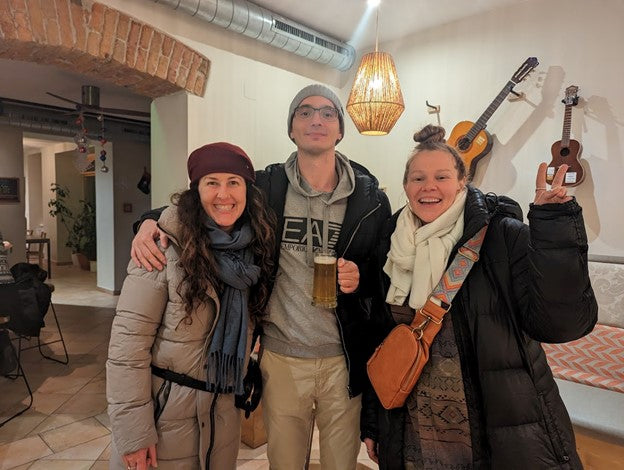Common Fears About Hostels
Hostels are one of my favorite types of accommodations when traveling solo. When I tell people this, I get a variety of responses such as:
- Are they safe?
- Are they clean?
- Isn’t it weird sleeping in a room with a bunch of strangers?
Don’t worry. I think I had some of those same thoughts myself before I finally took the plunge and actually stayed in my first hostels. And I can tell you that any fears that I had were 100 percent not valid. I don’t want to jinx myself, but all of my stays in hostels have been amazing thus far.

Now, I do admit that my positive experiences were primarily because I did my research first and I was smart when I traveled!
Here are a few of my top tips in how to do both.
Advanced Research Advice
-
Ask Other Travelers. When I was on a recent trip to Europe, I stayed in hostels almost primarily. In each hostel, I would naturally talk to my fellow hostelmates about where they had already been on their trip. If I found out that they had been to cities that were on my future itinerary, I would ask: “Where did you stay and what did you think of that hostel?” I always got very detailed and honest reviews that helped me narrow down my accommodation choices.

-
Do Research Online or on Apps. For most hostel travelers, Hostelworld is the go-to app for finding hostels, making reservations, and reading reviews from verified travelers. Hostelworld rates hostels on a scale of 1 to 10—a high number means it has received high marks from guests in a variety of factors: cleanliness, safety, social atmosphere, and so forth. My strategy is to look at the highest-rated hostels first, then I read the actual reviews to find out the specifics from recent guests. I don’t go back too far in the review string because experiences from even just several months ago will not be super accurate in the current conditions of the hostel. My main points of concern are cleanliness, safety, and location to public transportation. Anything else I can really work around.

Tips for a Pleasant Stay
-
Keep your valuables secure. I always bring my own lock. It’s a small padlock that I open with a key. I keep a backup lock in case that lock won’t work. Keep in mind that if you do forget a lock, some hostels rent or sell them, too. I always keep my valuable items in the locker. If my entire backpack fits, then it goes in. If not, then at least my smaller bag with my laptop, camera, etc. will go inside. Some hostels offer extra security behind the reception desk, and will actually recommend that you place valuable items there. Circus Hostel in Berlin was one of those.

-
Interact with Your Hostelmates. I’m generally a friendly person, so it’s not difficult for me to say hello to people when I first walk into a room or pass people in a hall. I also know how to read a room, though, and if the people in the room are clearly busy doing other things or in their own conversations, I respect that and don’t expect to interrupt them. I have met so many amazing friends at hostels just because I took the initiative to say hello, ask where they’re from, and where they’ve been, etc. The conversation usually just grows organically from there when it’s meant to!

- Bring Flip Flops. I would never really feel comfortable going barefoot in a hostel shower. Some are cleaner then hotels I’ve stayed at, but still, there are a lot more people potentially using that shower in between cleanings than in a hotel, so I just like to err on the side of caution. Flip flops are super lightweight and can be used for other purposes too (just walking around the hostel or out at the beach in summer), so they’re not a big deal to throw in your backpack or in the side pocket of a backpack.
- Hanging Toiletry Bags are a Must. In a hostel, you’re most likely not going to have shelves in the shower to put your soap, shampoo, etc. So, a hanging toiletry bag is really a must! Even if you have to DIY your bag with a strap and a carabiner, you'll definitely want to have a way to hang your bag up.
-
Bring A Microfiber Towel. Hostels generally rent towels, but having one of your own saves you a lot of money in the long run, plus it’s just super nice to have your own towel. Remember, cotton is rotten, so don’t bring a big fluffy towel. It will take forever to dry, will be heavy, and will take up a lot of space in your bag. Just opt for a microfiber towel. I honestly found that a small towel like this one from Amazon worked perfectly. It’s not big enough to wrap around me and walk around the hostel, but I wouldn’t do that with a regular size towel anyway. All I really need is a towel big enough to dry my body (I use something different for my hair), and then after I’m dry, I get dressed in the shower stall. This particular towel dries so fast and folds up into a small square case with a carabiner, which is a big plus since real estate in my bag is limited. My towel is in this tiny orange case attached to the outside of my bag (shown in the picture below).

What I Love Most About Hostels
There are so many things I love about hostels. Here are a few:
- I feel like the people who stay in hostels are my people. They are often solo travelers, digital nomads, or just outgoing people with an adventurous spirit who like to be surrounded by likeminded people. I have met some lifelong friends during my hostel stays.

- Hostels are generally located in the heart of the city next to public transportation, which is ideal if you are backpacking and want to see the highlights of a city quickly before you move on to the next town.
- Hostels generally have kitchens that are available for use by hostel guests. There are often refrigerators and cupboards for people to keep their food and cooking utensils, plates, and pots and pans to use for cooking. The hostel kitchen is often a great place to hang out, make your food, and chat with your fellow hostelmates! Making your own food while traveling is also healthier and a huge money saver. I don't mind going out to restaurants on occasion, but I make my own food while I'm at home, so I definitely prefer doing that when I travel, too, when possible!

- Some hostels have social gatherings such as walking tours, pub crawls, and even communal meals. These are all a terrific way to meet other travelers and make friends on the road. You aren’t going to find such opportunities in a hotel!

- Hostels are extremely inexpensive. I have paid as little as $17 a night for a stay in a hostel in Europe and it was a beautiful place in a prime location with a fantastic lounge area, kitchen, cozy beds, and plentiful clean bathrooms and showers. Seriously, $17 a night?
So, do you think you’d be willing to give hostels a try? Check out my other posts at these links that will tell you about some of my favorite hostels in select cities, and why they are my favorite.
Yoho International Youth Hostel: Salzburg, Austria
Circus Hostel: Berlin, Germany
Castle Rock Hostel: Edinburgh, Scotland
Hostel-Badgoisern: Bad Goisern, Austria
Hostel Ruthensteiner: Vienna, Austria
Wombat’s City Hostel Hauptbahnhof: Munich, Germany
City Backpackers Hostel: Stockholm, Sweden
FAQ: All About Hostels
Q1: Are hostels safe to stay in?Yes, hostels are generally safe accommodations for travelers. Most hostels prioritize the safety and security of their guests by implementing measures such as lockers, security cameras, and controlled access to dormitory rooms. It's also wise to bring your own lock for added security.
Q2: How clean are hostels?Hostels vary in cleanliness, but many maintain high standards of hygiene. Research hostels online using platforms like Hostelworld, which provide guest reviews and ratings for factors such as cleanliness. Reading recent reviews will give you an accurate idea of the hostel's current cleanliness.
Q3: Is it strange to sleep in a room with strangers?While it might seem unusual at first, sleeping in a dormitory room with other travelers is a common practice in hostels. Many travelers find it a unique opportunity to meet new people, share experiences, and make friends. Privacy curtains and individual reading lights are often provided to enhance your comfort.
Q4: How can I research and choose the right hostel?You can conduct advanced research by asking fellow travelers for recommendations and reading reviews on platforms like Hostelworld. Prioritize hostels with high ratings for cleanliness, safety, and social atmosphere. Look for recent reviews to ensure the accuracy of information.
Q5: How can I keep my belongings secure in a hostel?Bring your own lock to secure your belongings in lockers provided by the hostel. Consider keeping valuables in the locker, and if necessary, use extra security options like lockers behind the reception desk. Some hostels offer both options for added convenience.
Q6: How can I interact with other guests in a hostel?Initiate conversations with fellow travelers by saying hello and asking about their travels. Respect their privacy and cues – if they're engaged in other activities or conversations, allow them space. Interacting with hostelmates is a great way to make new friends and share experiences.
Q7: What essentials should I bring to a hostel?Essentials for a pleasant hostel stay include a lock for lockers, flip flops for shared showers, a hanging toiletry bag for convenience, and a microfiber towel for quick drying. These items enhance your comfort and help you stay organized during your stay.
Q8: What are the advantages of staying in hostels?Hostels offer several advantages, including meeting like-minded travelers, central locations near public transportation, communal kitchens for cost-effective self-catering, and social activities like walking tours and pub crawls. Hostels are also budget-friendly, making them a great choice for economical travelers.
Q9: Can I find hostels in prime locations?Yes, many hostels are strategically located in the heart of cities, close to public transportation and major attractions. This convenience is beneficial for travelers who want to explore a city efficiently and access its highlights without hassle.
Q10: Are hostels affordable?Yes, hostels are known for being budget-friendly accommodations. Prices can vary, but it's common to find affordable options, with rates much lower than hotels. Some hostels offer dormitory beds for as little as $17 a night, making them a cost-effective choice for travelers.
Q11: How do hostels promote social interactions?Many hostels organize social gatherings such as walking tours, pub crawls, and communal meals, providing opportunities for guests to meet and interact with each other. These activities are excellent ways to make friends, share stories, and create memorable experiences.
Q12: Can hostels provide a unique travel experience?Absolutely, hostels offer a unique travel experience by allowing you to connect with diverse travelers from around the world. The shared spaces, communal kitchens, and social events contribute to a vibrant and inclusive atmosphere that is often absent in traditional accommodations.


